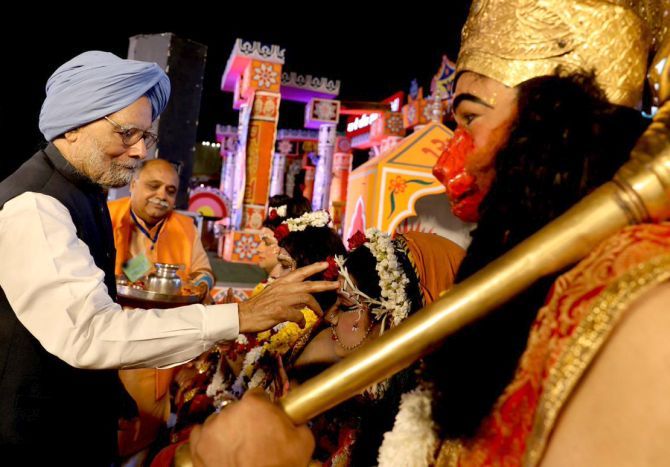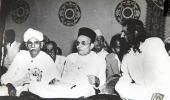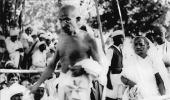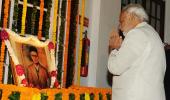'Savarkar was the closest the RSS had to a freedom movement icon, however flawed.'
'Indira Gandhi wasn't going to gift him to them.'
'And a non-career politician like Dr Singh understands it.'
'It is just that his party never listened to him,' says Shekhar Gupta.

The most intriguing thing about the latest Bharat Ratna-for-Savarkar controversy is how it has left the Congress with its knickers, khaki or not, in a twist.
Between outright condemnation of Savarkar as a Nazi, a hateful bigot, and a Gandhi assassination 'conspirator' who got away on a technicality, and Manmohan Singh's way more nuanced 'We respect Savarkarji but do not agree with his ideology', the Congress does not know its party line on an issue as sensitive as this.
Just a day after Manmohan Singh's cautious, but more sensible statement, the party was also trying desperately to distance itself from it. It fielded its spokesman Randeep Singh Surjewala. But his attempt to further 'nuance' Dr Singh's statement was desperate and pathetic. Because Dr Singh had indulged in neither sophistry, nor absent-minded ambiguity.
What he said could have been his party's position from the beginning and it would have spared itself the self-destructive back-and-forth now.
Especially when legions of Savarkar fans are pulling out the facsimile of the commemorative postage stamp Indira Gandhi issued to honour him in 1970, the glowing (although cautiously diplomatic) tributes she paid him, some even in writing. Also, that she patronised a documentary on his life and even made a donation of Rs 11,000 (equal to about Rs 5 lakh now) to a memorial fund.
So how does the Congress square its current position with hers?
Indira Gandhi was no P V Narasimha Rao, whom the Congress has repudiated and purged for his 'soft secularism', if not closet Hindutva, 'wearing khaki knickers' under his dhoti. They have also demanded a return to the party's old-style hard secularism.
Indira Gandhi is different. No one in the Congress would dare accuse her of being soft in her secularism, on Hindutva, or on anything else. Evidence of her 'toughness' lies across our geography (where it worked well, liberation of Bangladesh) and history (where it didn't, the Emergency).
It's a very well-known fact but still needs restating in this context that 60% to 75% of all those she detained during the Emergency were from the RSS and Jana Sangh. She had anything but a soft corner for them anywhere in her secular patriot's autocratic heart.
The fact is, Indira Gandhi was much more political than ideological in comparison to her legatees.
Historians will look for more evidence of why she acted the way she did on Savarkar, but I will hazard the guess that because she so detested the RSS/Jana Sangh, she did not want to cede to them anyone, of any persuasion, who may have made a contribution to the freedom movement. Not when her charge against the RSS always was that it gave the freedom movement a miss and collaborated with the British.
Savarkar was the closest the RSS had to a freedom movement icon, however flawed. She wasn't going to gift him to them.
To understand her thinking better, watch carefully how the Modi-Shah BJP is acting on the Congress party's long marchers's pantheon.
We had noted earlier how the RSS/BJP had a big problem: Absence of heroes from the freedom struggle. Even non-Congress ones like Bhagat Singh and Subhas Chandra Bose were far removed from their ideology. That's why their need for 'imports' from the Congress has been desperate.
Minus the Gandhi-Nehru dynasty (although they have Maneka and Varun Gandhi), they have been willing to embrace just about anyone. Sardar Patel had been taken much earlier, but this government is building him into a founder of the Republic bigger than Nehru.
Never mind that Patel was no fan of the RSS and banned it after the assassination of Mahatma Gandhi. There is plenty of documentation available on his negative view of the RSS. But, because his differences with Nehru were stronger and better documented, he was the first old stalwart the BJP took away from the Congress.
Lal Bahadur Shastri became the next. Others, of the old Congress Hindu Right, like Madan Mohan Malaviya have been easy pickings. All of this has happened in about the past three decades. Or, to put it in a more political context, in a post-Indira India.
These three decades are also marked by another phenomenon: The Congress party's rapid shift to the ideological Left. It is true that the party has always been Left of centre. Indira Gandhi used her socialism as a deadly political weapon even if it was destructive for the economy.
She used the socio-populist economic ideas of her Leftist hangers-on, but never let them run her politics. She was never going to give up her Hindu identity and symbols of religiosity like the rudraksh mala, pujas, sadhus, and tantriks as well.
Of course, none of her revolutionary durbaris dared raise a finger. This is so unlike today, when our politico-intellectual Left freely judges Rahul Gandhi for his temple visits and accuses the Manmohan view on Savarkar as a surrender to soft Hindutva.
They need to face up to the harsh truth that Indira Gandhi did not treat Savarkar as an enemy or a terrorist. I repeat for emphasis: She wasn't about to disown or cede any freedom fighter to the RSS. She knew politics.
Seshadri Chari, a leading RSS intellectual and a former editor of its mouthpiece Organiser, makes an important political point. That Indira Gandhi never described the Jana Sangh/BJP as a Hindu party. She was never going to put her politics at odds with Hinduism, or surrender India's majority's faith to her biggest rivals. She persistently and deliberately dismissed it as just a 'Baniya' party.
Figure out the difference. If you call them 'Hindu', you create a political push away for a lot of the Hindus. Baniyas, on the other hand, are a tiny and electorally marginal group. Plus, since they represent riches, profit-making, and money-lending, especially in rural India, not many of their fellow Hindus feel so strongly for them.
It also helped her dismiss the Jana Sangh/BJP claims of being reformist or pro-free markets as 'good-for-nothing' mercantilists. Baniyas.
Under Sonia Gandhi, the Congress has made that shift to fighting Hindutva/Hinduism rather than mercantilism, Chari suggests. And he makes sense.
The essential difference between the Congress during and after Indira Gandhi's times is this. That she employed and patronised Left intellectuals as her durbaris and used them and their ideas for her politics. Post-Sonia Gandhi, the Congress has increasingly let the Leftists and their intellectuals run its politics.
You want evidence: Check out the party's 2019 manifesto, promising repeal of the sedition law, dilution of the Armed Forces Special Powers Act, and thinning out troops from Kashmir.
If somebody had suggested that to Indira, she would have given him one kick in the butt. Or maybe she would have asked where they were fighting elections, in India or JNU.
Nehru was a socialist and had his own towering intellect. He didn't need anyone's help. In fact, the late S Jaipal Reddy often said that but for Mahatma Gandhi's influence, Nehru would have been an 'unreconstructed Marxist'.
Indira Gandhi boasted no such intellect, so needed to bring in outsiders to help construct her populism. But her politics was entirely her own. She built a deadly combination of nationalism and socialism that no 'party of Baniyas' was going to beat.
The equation has reversed now. Her legatees face the Modi-Shah BJP, which has a deadlier political trishul: Nationalism, religion, and socialism.
How does the Sonia-Rahul Congress respond? It is lost and therefore hypocritically ambivalent on Sabarimala, triple talaq, and Ayodhya. And if it insists on only the new, hard, Left socialism and concede nationalism and religion (also culture) to the BJP, they are fortunate to have even 52 in this Lok Sabha.
A non-career politician like Dr Singh understands it. It is just that his party never listened to him.
By Special Arrangement with The Print.











